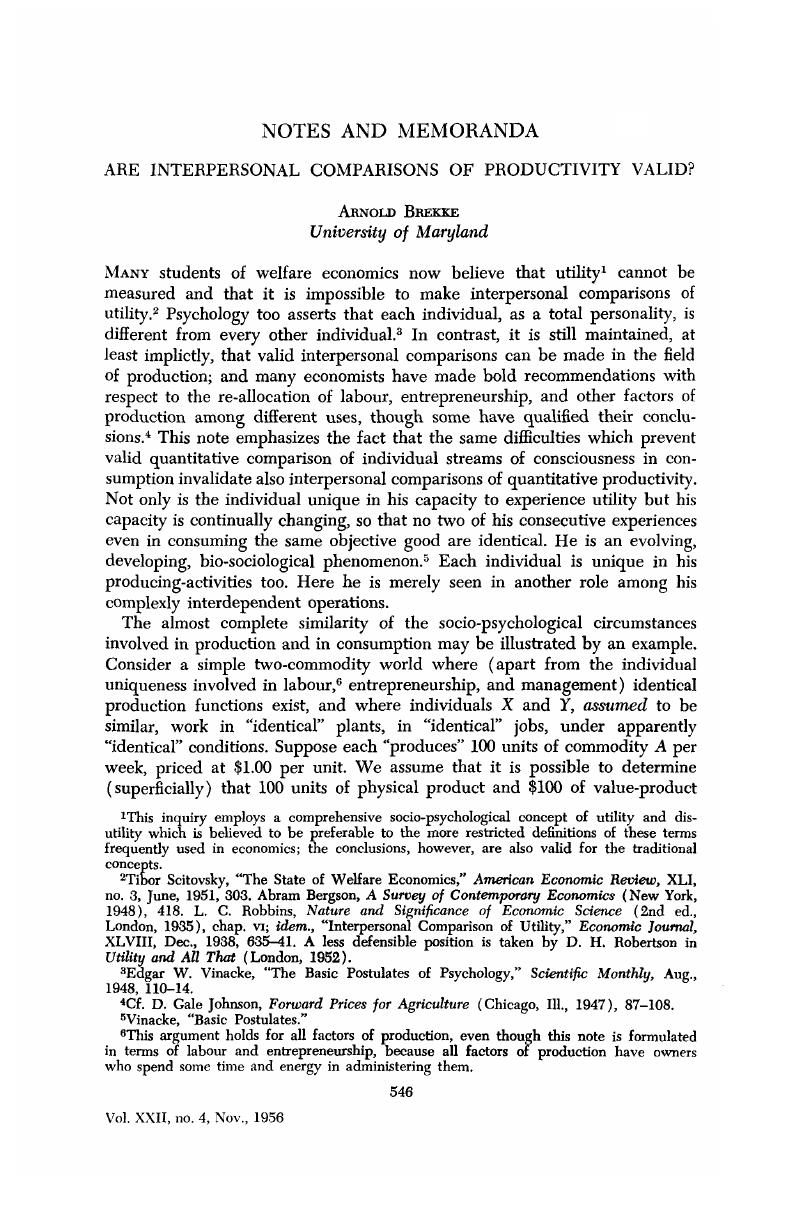No CrossRef data available.
Published online by Cambridge University Press: 07 November 2014

1 This inquiry employs a comprehensive socio-psychological concept of utility and disutility which is believed to be preferable to the more restricted definitions of these terms frequently used in economics; the conclusions, however, are also valid for the traditional concepts.
2 Scitovsky, Tibor, “The State of Welfare Economics,” American Economic Review, XLI, no. 3, 06, 1951, 303.Google Scholar Bergson, Abram, A Survey of Contemporary Economics (New York, 1948), 418.Google Scholar Robbins, L. C., Nature and Significance of Economic Science (2nd ed., London, 1935), chap, VIGoogle Scholar; idem., “Interpersonal Comparison of Utility,” Economic Journal, XLVIII, Dec., 1938, 635–41. A less defensible position is taken by Robertson, D. H. in Utility and All That (London, 1952).Google Scholar
3 Vinacke, Edgar W., “The Basic Postulates of Psychology,” Scientific Monthly, 08, 1948, 110–14.Google Scholar
4 Cf. Johnson, D. Gale, Forward Prices for Agriculture (Chicago, Ill., 1947), 87–108.Google Scholar
5 Vinacke, “Basic Postulates.”
6 This argument holds for all factors of production, even though this note is formulated in terms of labour and entrepreneurship, because all factors of production have owners who spend some time and energy in administering them.
7 Accepting for the purposes of this paper the view that marginal value-products in fact exist and can be determined; however, see Brekke, Arnold, “The Degree of Correspondence between the Concepts of Marginal Physical Productivity and its Empirical Referrents,” Journal of Farm Economics, 05, 1954.CrossRefGoogle Scholar
8 There are several sets of reasons for the incommensurability of labour inputs. One set of factors involves the relationship of the activity to the attitudes, interests, potentials, and value-structures of the workers. Another, also of great importance, concerns the group relations of people and the differential degrees of satisfaction obtained from the interpersonal interaction involved in the work-situation. A third set of factors includes the impact of one's occupation upon other sources of personal satisfaction, such as providing suitable opportunities and interests for non-work creative experiences. Many other reasons could be mentioned.
9 There is also some evidence that certain economists may implicitly assume that total economic welfare experienced by a society is derived from aggregate consumption alone—hence that experiences of human inputs can be ignored in the evaluation of the efficiency of resource utilization. This is patently an over-simplification and one that would usually be abandoned upon further consideration. Clearly, total welfare generated by economic activity must encompass the experiences encountered during production activities as well as those resulting from consumption.
10 Marshall, Alfred, Principles of Economics (8th ed., London, 1920), 140–1.Google Scholar
11 It is also true that consumption is similarly compounded of positive and negative utilities as anyone who has taken a vacation knows.
12 Cf. Huxley, Julian, Evolution in Action (New York, 1953).Google Scholar